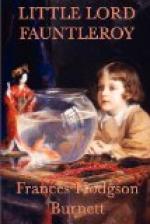“Stop a minute!” said his grandfather. “Where’s your hat?”
Wilkins touched his. “It fell off, your lordship,” he said, with evident enjoyment. “Wouldn’t let me stop to pick it up, my lord.”
“Not much afraid, is he?” asked the Earl dryly.
“Him, your lordship!” exclaimed Wilkins. “I shouldn’t say as he knowed what it meant. I’ve taught young gen’lemen to ride afore, an’ I never see one stick on more determinder.”
“Tired?” said the Earl to Fauntleroy. “Want to get off?”
“It jolts you more than you think it will,” admitted his young lordship frankly. “And it tires you a little, too; but I don’t want to get off. I want to learn how. As soon as I’ve got my breath I want to go back for the hat.”
The cleverest person in the world, if he had undertaken to teach Fauntleroy how to please the old man who watched him, could not have taught him anything which would have succeeded better. As the pony trotted off again toward the avenue, a faint color crept up in the fierce old face, and the eyes, under the shaggy brows, gleamed with a pleasure such as his lordship had scarcely expected to know again. And he sat and watched quite eagerly until the sound of the horses’ hoofs returned. When they did come, which was after some time, they came at a faster pace. Fauntleroy’s hat was still off; Wilkins was carrying it for him; his cheeks were redder than before, and his hair was flying about his ears, but he came at quite a brisk canter.
“There!” he panted, as they drew up, “I c-cantered. I didn’t do it as well as the boy on Fifth Avenue, but I did it, and I staid on!”
He and Wilkins and the pony were close friends after that. Scarcely a day passed in which the country people did not see them out together, cantering gayly on the highroad or through the green lanes. The children in the cottages would run to the door to look at the proud little brown pony with the gallant little figure sitting so straight in the saddle, and the young lord would snatch off his cap and swing it at them, and shout, “Hullo! Good-morning!” in a very unlordly manner, though with great heartiness. Sometimes he would stop and talk with the children, and once Wilkins came back to the castle with a story of how Fauntleroy had insisted on dismounting near the village school, so that a boy who was lame and tired might ride home on his pony.
“An’ I’m blessed,” said Wilkins, in telling the story at the stables,—“I’m blessed if he’d hear of anything else! He would n’t let me get down, because he said the boy mightn’t feel comfortable on a big horse. An’ ses he, ‘Wilkins,’ ses he, ’that boy’s lame and I’m not, and I want to talk to him, too.’ And up the lad has to get, and my lord trudges alongside of him with his hands in his pockets, and his cap on the back of his head, a-whistling and talking as easy as you please! And when we come to the cottage, an’ the boy’s mother come out all in a taking to see what’s




